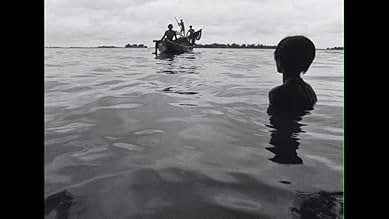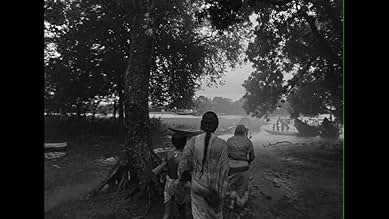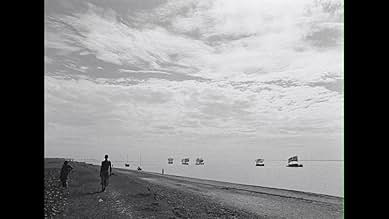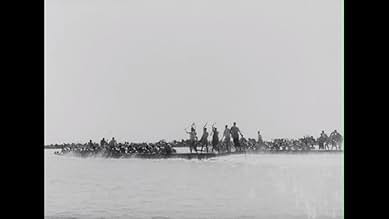IMDb RATING
7.2/10
1.5K
YOUR RATING
After their wedding night, a fisherman's young wife is kidnapped on the Titas River in Brahmanbaria, Bangladesh.After their wedding night, a fisherman's young wife is kidnapped on the Titas River in Brahmanbaria, Bangladesh.After their wedding night, a fisherman's young wife is kidnapped on the Titas River in Brahmanbaria, Bangladesh.
- Director
- Writers
- Stars
- Director
- Writers
- All cast & crew
- Production, box office & more at IMDbPro
Featured reviews
Rosy Samad gets married and goes on a honeymoon trip with her husband from the village where they live to a nearby village. However, she is discovered, without her husband, and no idea of what has happened. This disgraces her, and she spends the next ten years in exile, next to the village. Then a madman turns up, and she attempts to gain redemption by curing him of his madness.
You'd think that after a lifetime of reading fantasy and studying the anthropology of magic, this would be catnip to me. However, fantasy as it is written tends to have an almost engineering quality to its construction, with things like quests that must be undertaken, or great monsters that must be fought, or princesses that must be rescued. The patterns are too familiar. Likewise, the magic in these things is constructed like machinery. Occasionally you run across things based on Greek mythology, where the gods are squabbling people taking one side or the other, and throwing thunderbolts or sending earthquakes.
But to look at this movie is to see a society that is barely above animism, the belief that everything has a soul, whether it is a human or a cat, or a tree, or a rock. And the only way someone like me can handle a worldview like that is in a mechanical fashion. There is no mystery, just ignorance, and a rock falls from your hand to the ground when you release it regardless. But the characters in this movie believe in the mystery. The river Titas may just go away, or Miss Samad may just be fooling herself. No one knows anything, and no one can know anything. It's not a worldview I can believe, and so I am reduced to seeing if the movie is internally consistent.... but that won't work either, because if it's not, then that is also a mystery, an insoluble one that is a fact of existence.
It makes my head spin. Ritwik Ghatak's movie tells a tale of a small fishing village where reality and legend are the same thing. Is it a good telling? My Western mind can't really tell.
You'd think that after a lifetime of reading fantasy and studying the anthropology of magic, this would be catnip to me. However, fantasy as it is written tends to have an almost engineering quality to its construction, with things like quests that must be undertaken, or great monsters that must be fought, or princesses that must be rescued. The patterns are too familiar. Likewise, the magic in these things is constructed like machinery. Occasionally you run across things based on Greek mythology, where the gods are squabbling people taking one side or the other, and throwing thunderbolts or sending earthquakes.
But to look at this movie is to see a society that is barely above animism, the belief that everything has a soul, whether it is a human or a cat, or a tree, or a rock. And the only way someone like me can handle a worldview like that is in a mechanical fashion. There is no mystery, just ignorance, and a rock falls from your hand to the ground when you release it regardless. But the characters in this movie believe in the mystery. The river Titas may just go away, or Miss Samad may just be fooling herself. No one knows anything, and no one can know anything. It's not a worldview I can believe, and so I am reduced to seeing if the movie is internally consistent.... but that won't work either, because if it's not, then that is also a mystery, an insoluble one that is a fact of existence.
It makes my head spin. Ritwik Ghatak's movie tells a tale of a small fishing village where reality and legend are the same thing. Is it a good telling? My Western mind can't really tell.
The storytelling here is segmented and leans heavily on symbolism, but the acting is distractingly poor. It is difficult to stomach the dialogue, but that may be a translation/captioning issue.
This film by somewhat neglected Indian director Ritwik Ghatak is one of the most unusual I have ever seen. The stories are set among the harsh life around the banks of Bangladesh's rivers (one of the poorest regions of the world). It tells several gruesome tales: abductions, escapes, living among strangers, death, though the characters go through this with the resignation of someone who knows that life is hard and always have been. Now, having seen this film more than a decade ago, I cannot recall all the details. But the unusual part is the way this story is told. It puts a character at the center of the story for, say, twenty minutes, and then it moves to another character, who was playing a minor role in the first story. And then to another character, and so on. It is a collection of stories, but loosely (or not so loosely interconnected). Overall, a fine tapestry of life in one of the poorest parts of the world.
1. River and River and life related to that clearly depicted in the film Titas( Name of a river and peoples around it ) Ekti Nodir Naam ( Name ).
2. Clearly depicts how peoples of different religion lives side by side without effecting their livelihood. and still role is being played by the peoples who are rich and who are poor . In the name of religion , they created sect , actually which represents the privileged peoples and peoples who lives on fishing, farming and united . But some how money divides them actually rich uses it as a tool to destroy the unity and peace of a community.
3. River scenes, Boats and Rain greatly depicted in the film, excellent cinematography
2. Clearly depicts how peoples of different religion lives side by side without effecting their livelihood. and still role is being played by the peoples who are rich and who are poor . In the name of religion , they created sect , actually which represents the privileged peoples and peoples who lives on fishing, farming and united . But some how money divides them actually rich uses it as a tool to destroy the unity and peace of a community.
3. River scenes, Boats and Rain greatly depicted in the film, excellent cinematography
10smkbsws
When anybody (even I used to say the same) tells you more money leads to lesser art, this epic saga can be a staple example to prove them wrong. This is based on a semi autobiographical novella by Adwaita Mallabarman, depicting the life and times of a fishing society by the bank of a River, called Titas, over a period of time. I can say that this has more distinguishable cast than "Sholay". Or till some extend, this has the range, both chronological and geographical, this even tops "Gangs Of Wasseypur" or "The Godfather" series. There are many features and documentaries on this film and I remember someone telling this was Ghatak's El Dorado (Note that the kid in "Bari Theke Paliye" started his journey by inspired of the stories of El Dorado). One of the major positive change was in editing, and the uber famous Bashir Hossain did show his fresh take on cutting and transitions to both Bangladeshi and West Bengal audience. His technique was so liked that Ghatak hired him again for his own semi autobiographical "Jukti Takko Aar Gappo". Another thing is heavily layered and beautifully set up blocking, which we have been seeing from "Ajantrik" till his latest series, and kudos to Baby Islam's camerawork to take it to the next level. One of my friend told that Ghatak loved the relationship between a boat and camera, which was incepted in "Bari Theke Paliye", shown accordingly in the trilogy and blooms to its full potential in this film. Also, have to mention the plot explicitly as it shows the microcosm of a society of people who belong to the lower caste of a minority section and all the hierarchy was used for plots.
Did you know
- TriviaDirector Ghatak appears in the film as a boatman, and Basanti's story is the first of several melodramatic tales.
- Quotes
Ramprasad: That's the way it happens. It all comes and then disappears again. There's a spark of life. And suddenly it's not there. It all becomes untraceable. You were a child yesterday. Today, you're a woman. This ever-flowing river Titas may become bone dry tomorrow. It may not even have the last drop without which our soul cannot depart. Yet these flocks of sails move on and on and on...
Details
- Release date
- Country of origin
- Official site
- Language
- Also known as
- A River Called Titas
- Production company
- See more company credits at IMDbPro
- Runtime
- 2h 39m(159 min)
- Color
- Sound mix
- Aspect ratio
- 1.37 : 1
Contribute to this page
Suggest an edit or add missing content















